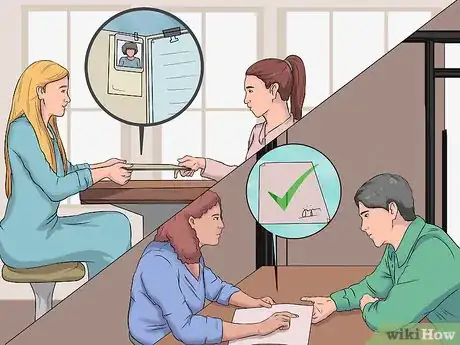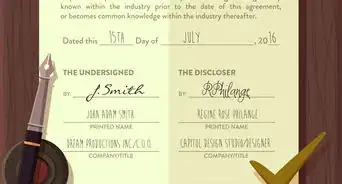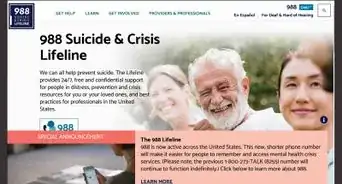This article was co-authored by Trudi Griffin, LPC, MS. Trudi Griffin is a Licensed Professional Counselor in Wisconsin specializing in Addictions and Mental Health. She provides therapy to people who struggle with addictions, mental health, and trauma in community health settings and private practice. She received her MS in Clinical Mental Health Counseling from Marquette University in 2011.
This article has been viewed 123,871 times.
Confidentiality is an essential part of the counseling relationship. A client must be able to trust that the personal information he or she shares with you will not be revealed to other people. To protect their professional relationships, a counselor must explain the benefits and problems inherent in counseling services and clarify the limits of confidentiality to the client. Importantly, counselors have their own set of professional obligations which vary slightly from those of other mental health providers and which will vary from state to state.
Steps
Explaining Confidentiality
-
1Provide informed consent. To give informed consent, the counselor must explain the benefits and risks of counseling as well as its alternatives. They must also explain state laws regarding when they may be required to break confidentiality and describe how they might be required to do so. The counselor must request permission to record counseling sessions in writing or via video and audio. Counselors have a wide range of issues they should raise during a discussion of informed consent.
- These include the purposes, goals, techniques, and limitations of counseling.
- The counselors should discuss their qualifications, their credentials, their relevant experience, their approach to counseling and provisions for continuation of service should the counselor become unavailable to continue treatment.
- You should also explain fees, billing, and procedures in case of nonpayment.
- If any supervisors or peers will review records, this should be noted in the informed consent procedure.[1]
-
2Explain protection procedures. To obtain informed consent you need to explain how you will protect confidentiality. This includes detailing how records will be stored. It also includes explaining cases in which the client’s comments are not confidential.[2]
- This applies to electronic communications as well, including after hour phone calls, text messages, email, and skype sessions. You should discuss how confidentiality shall be maintained in such circumstances, and what risks to client confidentiality emerge when you are contacted after hours.
Advertisement -
3Give the patient a form to sign. You should provide a written form for the patient to sign, authorizing informed consent. This should remain in your patient’s file. The language of the form is subject to change, but it should be inviting and easy to read. It should also cover most of the aforementioned points.
- It is advisable that you keep a copy of the form in the lobby so that patients can read it before speaking to you.[3]
-
4Get parental permission for minors. When counseling those under 18, informed consent must come from a parent. You should have two separate forms, one informed consent form that the minor signs and another consent for treatment of minors form that the parent signs.[4]
-
5Describe research. If the sessions will be the basis for published research, this should be disclosed to the patient. Whether or not they will be anonymous and how their anonymity will be protected must be discussed.[5]
Protecting Client Records
-
1Store records safely. To maintain confidentiality, it is the counselor's responsibility to keep the client's records safe and appropriately secured. Records should be locked away where only the counselor can reach them.[6]
-
2Protect records at home. It is important that you lock away documents at home as well as at the office. However, you might need to step away from your desk or take an emergency phone call with others around. You should ensure that anyone you reside with is aware of confidentiality procedures.
- You should inform anyone with whom you reside what areas are off limits.
- You should also make it clear to anyone around when a phone call is confidential. Close the door and inform them that they should leave you alone.[7]
-
3Provide records to client. A client may request his or her own records in most situations. The counselor however can refuse to provide access to portions of the records if it will cause harm to the client. The counselor must document the request of the client and the reason for withholding the information.[8]
- When there are multiple clients, such as with family counselling, then the counselor should only provide records relevant to the individual client, not other clients in the group.[9]
-
4Do not release records to any third parties. A client's records are only to be released to a third party if the client has provided written consent. This includes third parties who pay for treatment.
- With minors it is important to also obtain consent from parents before releasing information to a third party[10]
-
5Be aware of exceptions. There are some exceptions when confidentiality should not be preserved. These vary somewhat with state law. You should make both yourself and your clients aware of these exceptions. Generally there are a few standards for the lapse of confidentiality:
- Confidentiality is waived when the client makes threats of suicide or homicide.
- It is also waived when information is disclosed relevant to the abuse of children or the elderly.[11]
- Depending on the state in which you operate, you might be required to reveal to a third party when your client has a life-threatening disease that could be communicated to said third party.[12]
- If a court subpoenas your records you should ask for written consent from your client. If that is not forthcoming, it is your responsibility to try to limit or prevent the disclosure of records.[13]
-
6Stay current with counseling ethics and regulations. Counseling associations such as the American Association of Marriage and Family Therapists (AAMFT), the American Counseling Association (ACA )and the American Mental Health Counselors Association (AMHCA) all provide their members with a set of ethics for conducting counseling which include how to maintain confidentiality in a therapeutic relationship. You should also familiarize yourself with state regulations.
- When a counselor finds him or herself in a situation where maintaining a client's confidentiality becomes a problem, consulting with colleagues and/or a direct supervisor can help the counselor with appropriate decision-making.
- A counselor may also discuss confidentiality concerns with his or her own therapist, so long as they don’t reveal information that may identify the client being discussed.
Protecting Against Lapses in Conversations
-
1Avoid confidential details in discussions with peers. When a counselor seeks advice from a fellow professional about a client, they should not disclose confidential information. Information that is provided should not allow for the identification of the client. Furthermore, it should be limited to what is necessary to obtain relevant suggestions.[14]
-
2Change details. When engaged in conversation with friends or family, change important information about clients. Alter facts so that the client will be in no way identifiable.[15]
-
3Do not engage in conversations in public. All conversations about clients should be in a private setting. If you receive an urgent phone call from a client, try to find a private place from which to return the call.[16]
-
4Do not acknowledge clients in public. Clients might not want their association with you to be public knowledge. Do not acknowledge them, unless they acknowledge you first.[17]
Things You'll Need
- Informed consent documents
- Confidentiality form
- Client chart
- Mental health association codes of ethics
References
- ↑ https://www.zurinstitute.com/resources/ethics-of-confidentiality/
- ↑ https://www.zurinstitute.com/resources/ethics-of-confidentiality/
- ↑ http://www.wvbec.org/images/Implementing_Informed_Consent.pdf
- ↑ http://www.wvbec.org/images/Implementing_Informed_Consent.pdf
- ↑ https://www.zurinstitute.com/resources/ethics-of-confidentiality/
- ↑ https://www.zurinstitute.com/resources/ethics-of-confidentiality/
- ↑ https://books.google.com/books?id=CvpMAgAAQBAJ&lpg=PA47&ots=TgtXFj7y4b&dq=should%20therapists%20say%20hello%20to%20clients%20in%20public&pg=PA115#v=onepage&q=talk%20at%20home&f=false
- ↑ https://www.zurinstitute.com/resources/ethics-of-confidentiality/
- ↑ https://www.zurinstitute.com/resources/ethics-of-confidentiality/
- ↑ https://www.zurinstitute.com/resources/ethics-of-confidentiality/
- ↑ http://www.wvbec.org/images/Implementing_Informed_Consent.pdf
- ↑ https://www.zurinstitute.com/resources/ethics-of-confidentiality/
- ↑ https://www.zurinstitute.com/resources/ethics-of-confidentiality/
- ↑ https://www.zurinstitute.com/resources/ethics-of-confidentiality/
- ↑ https://books.google.com/books?id=CvpMAgAAQBAJ&lpg=PA47&ots=TgtXFj7y4b&dq=should%20therapists%20say%20hello%20to%20clients%20in%20public&pg=PA115#v=onepage&q&f=false
- ↑ https://books.google.com/books?id=CvpMAgAAQBAJ&lpg=PA47&ots=TgtXFj7y4b&dq=should%20therapists%20say%20hello%20to%20clients%20in%20public&pg=PA115#v=onepage&q&f=false
- ↑ https://books.google.com/books?id=CvpMAgAAQBAJ&lpg=PA47&ots=TgtXFj7y4b&dq=should%20therapists%20say%20hello%20to%20clients%20in%20public&pg=PA115#v=onepage&q&f=false











































































